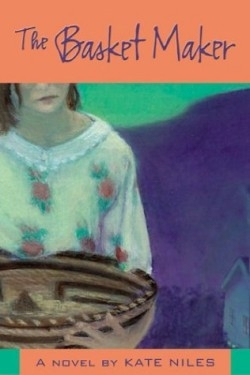
The Basket Maker
Shaman and “transcendental clairvoyant” are titles that don’t easily sit on the shoulders of the keen, plainspoken dead and living characters of this winning first novel, but they should. Sarah, a lonely eleven-year-old girl new to this Colorado track house she can’t call home, stumbles over the semi-preserved buckskin-covered remains of Ute Chief Ouray. She introduces herself, then leaves.
Meanwhile, his perturbed spirit, still bloodthirsty for recompense for his son who was abducted in a massacre more than a hundred years before (President Grant gave him a tour of Washington: he didn’t think much of the man’s politics or taste in music) introduces himself to Sarah’s neighbor, an elderly widow with her own sad secret mourning. They talk, comparing heart wounds. And much later, when these two ancients peek into Sarah’s basement in the middle of the night and in effect summon both the local police and the Great Spirit to rescue Sarah from terrible abuse, it is one of several lovely, spell-binding moments of fantasy and reality that the author vividly makes into redemption. The jagged bloody-red mesa peaks and the hurtful hands of humans must still learn to co-exist.
Niles, a Colorado poet and creative writing instructor, published a book of poems, Geographies of the Heart, 1997, and her short stories have appeared in publications like The Louisville Review and Feminist Quarterly. Here, she splinters her story between the several points of view of the local parents and children, each touching upon the traumatic recovery of a boy badly burned in a freak accident. Niles deftly maintains the weaving motif of the title as a metaphor of healing scars and the living tissue of recovery.
She introduces readers to an ancient Indian marriage and a modern social worker, a ghost from a mining disaster generations ago and Sarah’s furious lost mother, a Ph.D. from Princeton, and even talkative spirits of the place-snow geese who act as a chorus of modest observers to the “pale, two-legged” marvels who create such chaos. But the tragic-comic genius of the place is that Indian Chief-his voice (and hologram vision of a body) is a pleasure. He’d be at home anywhere, even, one imagines, as a guest on “The Oprah Show.”
Disclosure: This article is not an endorsement, but a review. The publisher of this book provided free copies of the book to have their book reviewed by a professional reviewer. No fee was paid by the publisher for this review. Foreword Reviews only recommends books that we love. Foreword Magazine, Inc. is disclosing this in accordance with the Federal Trade Commission’s 16 CFR, Part 255.
